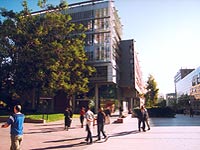Pure Mathematics - MATHPH3986
Stream Summary
Faculty: SCI - Faculty of Science
School: School of Mathematics and Statistics
Contact: www.maths.unsw.edu.au
Program: 3986 - Advanced Mathematics
Award(s):
Bachelor of Science (Advanced Mathematics) (Honours)
View stream information for previous years
Stream Outline
Students who enrol in the Pure Mathematics Honours Stream are expected to have completed a mathematics major in an undergraduate science or other mathematically focused program. Students who have completed other cognate disciplines and who are completing a project within the usual concerns of this discipline may also apply for entry to this stream.
Honours in Pure Mathematics can be completed full-time or part-time. Most students commence their enrolment in semester 1 (S1) but mid-year entry is available subject to resources. Students should check the MathStats Honours webpages for application procedures and enrolment deadlines. Students should note that timetabling for some honours level courses occurs at a specially convened meeting in week 0 of each semester.
Stream Structure
- MATH4001 Mathematics and Statistics Honours thesis A (6uoc)
- MATH4002 Mathematics and Statistics Honours thesis B (12uoc)
Students will also be required to participate in the weekly honours seminar, which will be timetabled as a joint class in the thesis courses. This seminar is intended to allow students to practise their final honours seminar presentation, listen to presentations of other honours students and engage in other honours training activities. Students should also attend any appropriate seminars in their thesis area.
The thesis will be assessed by at least two academic staff. The supervisor or supervisors of the thesis is expected to submit a report, but will not be a marker for the thesis. Students are required to give a short seminar on their thesis and this will account for 10% of the final mark for the thesis, the remaining 90% coming from the written thesis report.
The 30uoc coursework component of pure mathematics honours will consist of five 6uoc lecture courses at honours/postgraduate level (typically MATH5xxx courses). The suite of courses must be approved by the Head of School or nominee and taken with the advice of the honours thesis supervisor. A student may be permitted to take one or, exceptionally, at most two, courses from outside the School of MathsStats, for example at the AMSI summer school, at another institution or at another UNSW academic unit.
The marks for the thesis and other honours courses will be combined to give a weighted average mark forming a final honours mark which will be used to decide the grade of honours the student will be awarded as follows:
- Honours class 1 -- final mark of 85 or over
- Honours class 2, Division 1 -- final mark from 75 to 84
- Honours class 2, Division 2 -- final mark from 65 to 74
- Honours class 3 -- final mark from 50 to 64
Admission Requirements
To enter honours in pure mathematics, students must have
- Completed a mathematics major in the Science or Advanced Science program, including at least 30 units of credit in Level III mathematics or which at least 18uoc must in in level III pure mathematics, or
- Completed Stage 3 of the pure mathematics plans in the Advanced Mathematics degree or;
- Completed a suitable mathematics or statistics degree at another university.
- An average above 70 in their level III mathematics courses and
- An average above 70 in level III pure mathematics courses.
With the permission of the Head of School (or nominee), a student may be allowed into Pure Mathematics Honours without having satisfied the specific departmental requirements, and instead have shown some evidence of the ability to undertake independent study.
Pathways
http://www.maths.unsw.edu.au/futurestudents/postgraduate-coursework
http://www.maths.unsw.edu.au/futurestudents/postgraduate-research
Graduates of a mathematics or statistics honours plan are also well qualified to find employment in many sectors. Past honours graduates have found employment in areas such as banking, computing, education, finance, government, medical research and meteorology. The Australian Mathematical Society (http://www.austms.org.au/HomePage) and Australian Mathematical Sciences Institute (http://www.amsi.org.au/) maintain up-to-date information on career prospects in mathematics and statistics.









